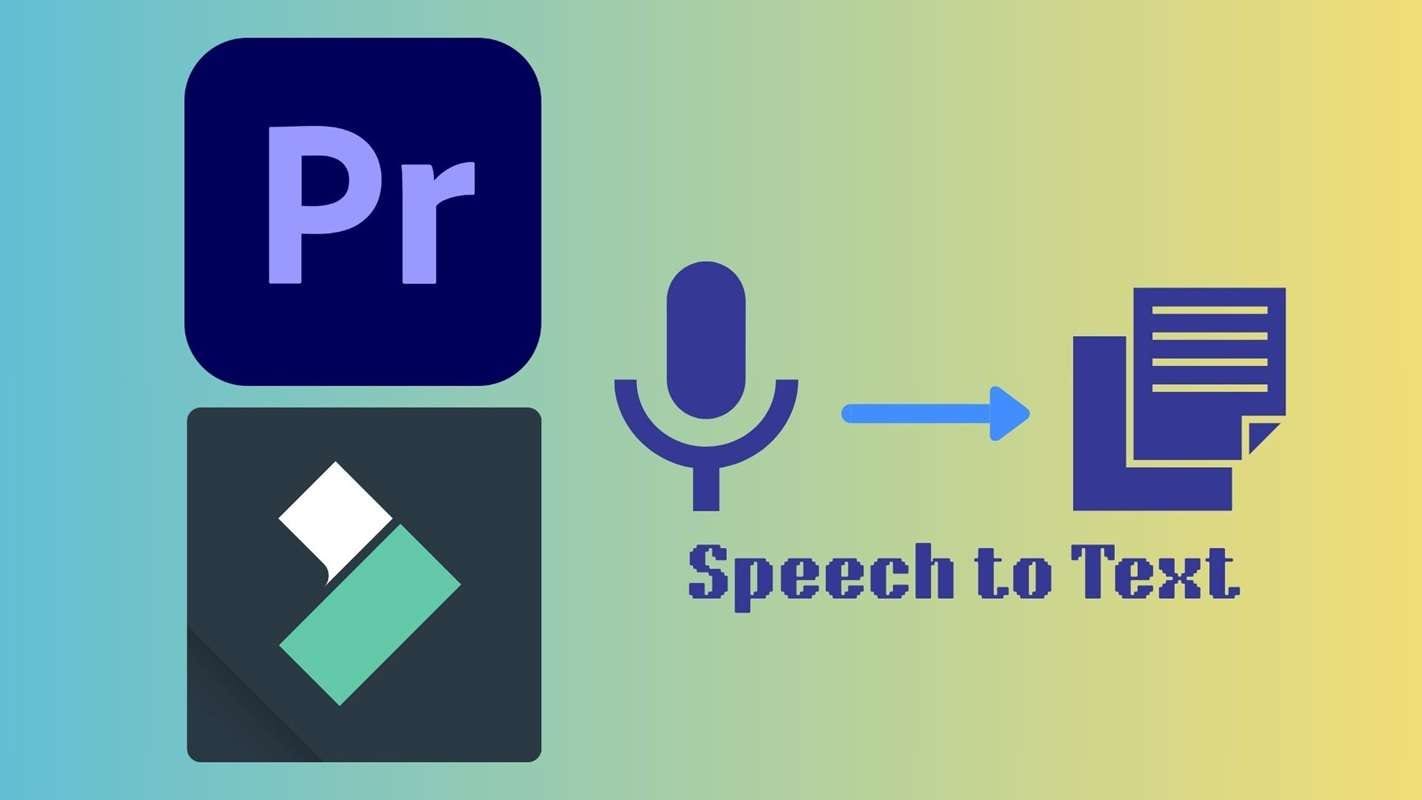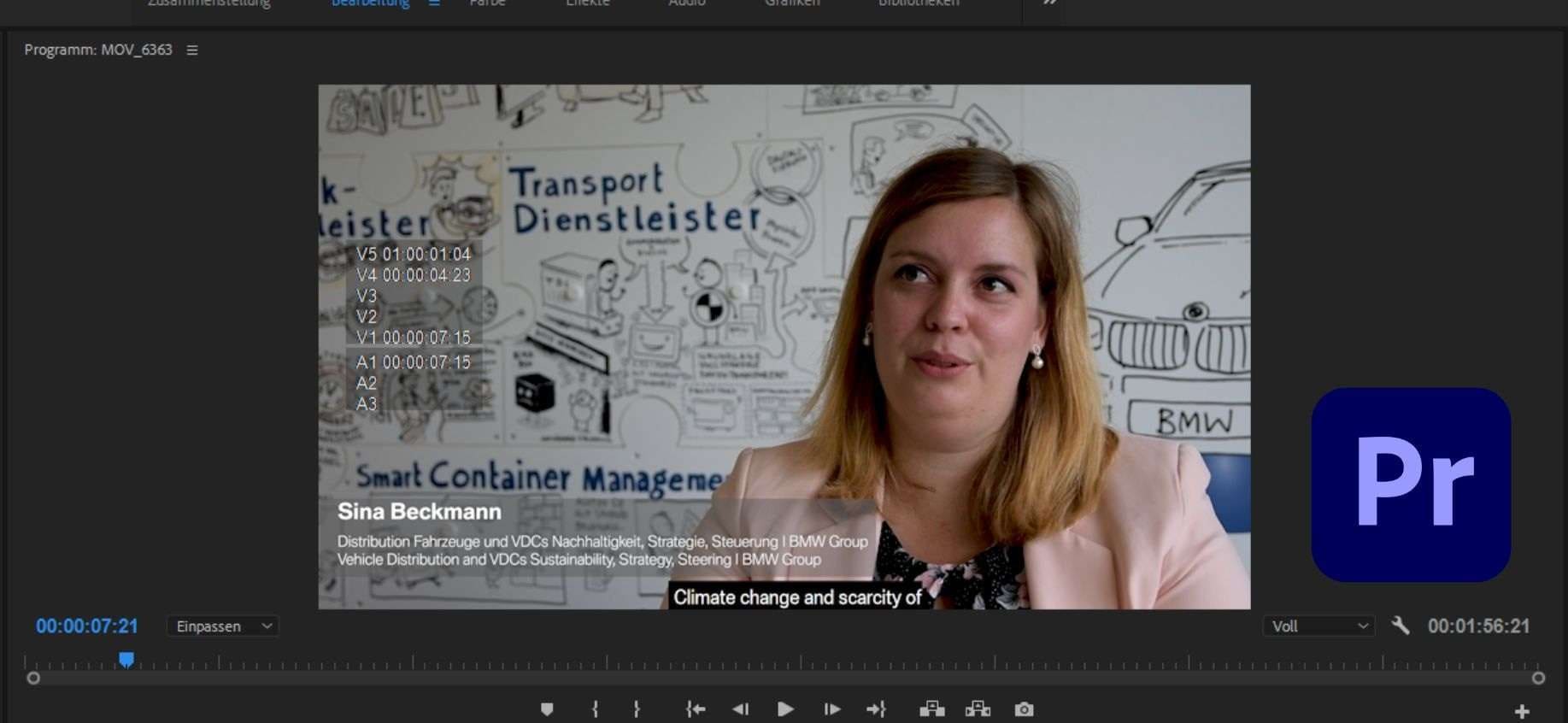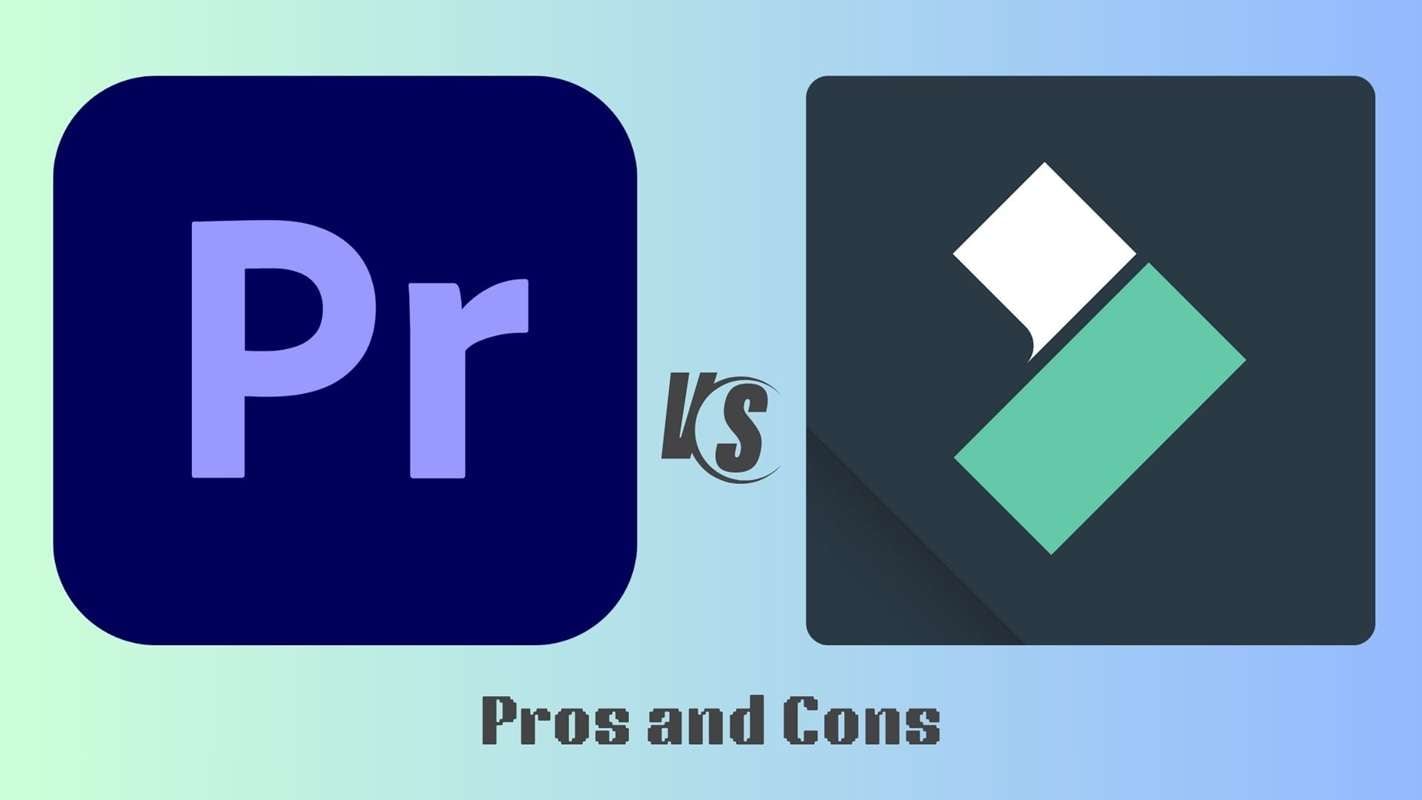In this article
Captions and transcripts are essential elements of video editing. Still, their role is now being overtaken by speech-to-text (STT) tools that simplify and streamline your work for YouTube tutorials, TikToks, or corporate training, so your content is more accessible to global audiences.
Two popular video editors that have STT features are Wondershare Filmora and Adobe Premiere Pro. Both have quite different approaches, where Filmora is known for its simplicity and speed, while Premiere Pro offers more control and professional options.
To determine which editor is best suited for you, we need to compare Speech-to-Text Premiere Pro and Filmora side by side, and also examine their strengths and weaknesses in detail in this article.

Part 1. Key Specs & Parameters Comparison Table
Before we discuss Speech to Text in Filmora vs Premiere Pro in detail, below is a side-by-side comparison showing key specs and parameters for you to know at first. Here are Filmora and Adobe Premiere Pro's STT/transcription (and related) capabilities:
| Feature / Parameter | Filmora | Adobe Premiere |
|---|---|---|
| Languages supported | Filmora Speech to Text (STT) supports 45 languages and dialects. | Languages supported by Premiere Pro Speech-to-Text: ~16 languages currently. |
| Accuracy/Error rate | Claims up to 99% accuracy under ideal conditions. | Users report an accuracy rate of around 50–80% depending on the conditions. |
| Common Errors | Less common words, accents, or background noise. | Punctuation, unfamiliar names, and accents. |
| Speed of transcription | Fast, usually done online in a few clicks. | Cloud-based and quite fast. A 3-minute clip can be finished in less than 2 minutes. |
| Editing/correction features | Let you edit text, timing, and animated caption templates and customization. | Offers full transcript editing, speaker labels, and precise caption timing tools. |
| Export/Captions formats supported | Supports exporting SRT files or using built-in animated captions. | Can export transcripts, SRT files, or add captions directly on the timeline. |
| Text-to-Speech | Yes. Converts text to voice in 33 languages. | No built-in TTS feature. You need third-party tools. |
| Interface | Beginner-friendly, one-click workflow, simple design. | Professional layout with greater control, but requires more time to learn. |
| System/hardware requirements | Runs on Windows and macOS; supports M1/M2 chips. | Runs within Premiere Pro, so it needs good hardware for smooth editing. |
| Pricing & limits | Filmora uses AI credits (about 4 credits per minute of video). Higher plans give more credits each month. | Included in your Premiere Pro subscription with no per-minute charge. |
Part 2. What Is Filmora's Speech-to-Text / TTS Capability
Filmora made adding subtitles and voiceovers so easy, even if you're a beginner. Filmora's Speech-to-Text (STT) tool automatically converts the words spoken in your video into subtitles. The process is super simple: just select a clip, click the STT button, choose a language, and let Filmora finish the work for you.
In seconds, you'll get editable subtitles that you can customize with fonts, colors, and animation templates. With up to 45 languages supported by Filmora, it can be a useful tool for multilingual creators.

Moreover, Filmora's text-to-speech feature is just as convenient, which converts written text into a natural-sounding voiceover. You can choose from various voice styles and languages, adjust the speed or tone, and use it to narrate tutorials, how-to videos, or social media content without having to record your own voice.
Strengths
- Easy workflow: Both text-to-speech and speech-to-text can be done with a single click.
- Wide language support: 33 languages for TTS and 45 for STT.
- Customizable output: Editable subtitles and multiple voice options.
- Quick outcomes: Subtitles and voiceovers are generated in seconds.
Limitations
- Dependent on audio quality: Strong accents or loud noises reduce accuracy.
- Credit-based usage: For heavy users, STT and TTS may be restrictive because they require AI credits.
Part 3. What Is Premiere Pro's STT / Transcribe / Captions Feature
With the integration of subtitle tools with Adobe, Premiere Pro seamlessly enables you to create accessible and searchable videos. Premiere Pro's speech-to-text feature automatically transcribes your video audio and generates subtitles directly on your timeline.
The process is also pretty straightforward: select a clip, go to the Text panel, and click Transcribe Sequence. Premiere Pro uses Adobe Sensei cloud-based AI to process the audio and generate highly accurate transcripts.

Premiere Pro supports more than a dozen primary languages, including English, Spanish, French, German, Japanese, and Korean. You can choose between translating the entire sequence or just selected clips, then generate subtitles with multiple style options.
The generated subtitles are fully editable, so you can adjust timing, correct words, and reformat them to match your brand.
Strengths
- High accuracy: Works well even with mild background noise or multiple speakers.
- Speaker labeling: Capable of automatically recognizing and clearly labeling speakers.
- Advanced editing: It enables you to jump to particular points in the timeline and search the transcript text.
- Professional output: Compatible with SRT, SCC, and other standard caption formats.
Limitations
- More steps compared to Filmora's one-click approach mean a steeper learning curve.
- Requires a more powerful computer to function properly, particularly while playing lengthy sequences.
Part 4. Feature-by-Feature Comparison: Filmora vs Premiere Pro

Comparing the features of Filmora and Premiere Pro side-by-side will make it easier for you to weigh them against each other. Here's a comparison of them based on the most important factors:
1. Accuracy in Different Conditions
Filmora delivers good results for clear audio with only one speaker, but it may struggle with heavy background noise or thick accents. While Premiere Pro, with Adobe's AI tools, can separate voices and even add speaker labels, it generally performs better in challenging conditions.
2. Language / Dialect Support
Filmora supports around 45 languages for speech-to-text and 33 languages for text-to-speech. Premiere Pro supports fewer languages overall, but its transcriptions are highly optimized for the languages it supports, so they're super accurate for professional projects.
3. Editing & Adjustments
If you're looking for an editor with easy-to-edit subtitles and quick timing adjustments, Filmora is the answer. However, if you're looking for more in-depth editing controls, including searchable transcripts, multiple subtitle tracks, and precise alignment with your timeline, which is useful for long-form content or content with multiple speakers, Premiere Pro is a better choice.
4. Speed & Performance
Filmora is faster for most casual users as it utilizes a simple cloud process and produces results in seconds. Premiere Pro may take a little longer for a long video due to its detailed analysis, but this is balanced with better accuracy and speaker separation.
5. Formats & Export Options
Filmora allows you to export translated captions as built-in subtitles or as SRT/VTT files. Premiere Pro supports more industry-standard formats (SRT, SCC, XML, and others), which makes it ideal for broadcast or streaming platforms that have strict translation captioning requirements.
6. Text-to-Speech
When it comes to Text to Speech (TTS) features, Filmora is leading the way with its built-in TTS feature that offers a diverse range of voice styles and languages. Meanwhile, Premiere Pro currently does not have a TTS feature, so you need to use external tools or plugins to create automated voice narration.
Usability for Beginners vs Professionals
With its one-click process and intuitive interface, Filmora is most likely very beginner-friendly. Premiere Pro is more suitable for professional editors who seek full control and are comfortable with a steeper learning curve.
Part 5. Suitability for Different Use Cases

The types of content you would like to produce and how much creative control you want will affect your choice between Filmora and Premiere Pro. Below is a brief explanation of which tools are best suited for different purposes:
- YouTubers/Social media creators who need fast captions
Filmora is an ideal option if you need quick captions or voiceovers with minimal setup. Its one-click workflow and built-in Filmora text-to-speech tool lets you add subtitles and narration for Shorts, Reels, or TikToks in minutes.
- Corporate, Educational, and Accessibility Projects
Those who prioritize sharp accuracy will find Premiere Pro as their best choice. Its ability to label speakers, search transcripts, and export professional closed caption formats works well for training videos, webinars, or closed caption compliance.
- Multilingual or non-native speakers:
For flexibility with a global audience, Filmora has a wider range of languages, which makes it a great fit. Premiere Pro is more accurate in the languages it supports, but has fewer selections.
- Low-budget or Hobbyist vs. Professional Editors
Filmora offers affordable subscriptions with an STT/TTS credit system, so it's more accessible for creators on a budget. Premiere Pro requires a Creative Cloud subscription, which is more expensive but comes with professional tools.
- Speed vs Control Trade-offs
In Filmora, you can edit videos quickly and easily, while Premiere Pro gives you more control over each step of the process, more suitable for complex projects.
Part 6. Pricing & Limitations Comparison
If you rely on the speech-to-text feature and use it frequently, pricing becomes an important factor in choosing which tool suits your workflow and also your budget.

Filmora
Filmora offers a free plan, but exported videos will have a watermark, and AI tools such as speech-to-text (STT) or Filmora text-to-speech (TTS) have limitations.
- Paid plans remove the watermark and include a number of AI credits each month that can be used for transcription, text-to-speech, and other AI tools.
- Filmora offers a reasonable and flexible subscription fee. This makes it suitable for those who are new to editing but need advanced features, casual users, or those who only need subtitles for short videos.
Premiere Pro
Premiere Pro is only available through an Adobe Creative Cloud subscription, which has a higher monthly cost than Filmora. On the plus side, the Premiere Pro speech-to-text feature is fully included at no extra cost per minute, more suitable for those who frequently transcribe large amounts of content.
However, you need to stay subscribed to keep accessing the software and its features.
Key Limitations
- Filmora: Limited AI credits, which can be a drawback for high-volume users, and accuracy may decrease with difficult audio.
- Premiere Pro: Requires a more expensive subscription and a computer with high specs, which might not be practical for beginners or hobbyists.
Part 7. Pros & Cons Analysis
As you consider your options, you should also look at the strengths and weaknesses of each tool. For your consideration, here is a summary of the pros and cons of Filmora and Premiere Pro.

Filmora Pros and Cons
Pros
- Well known for its ease of use, with a simple speech-to-text process that requires just one click.
- Filmora has a built-in text-to-speech feature with various voice styles and languages.
- Affordable monthly subscription price.
- Fast transcription speed for short and medium-length videos.
- If you are a casual creator or YouTuber, Filmora is the perfect choice for you due to its beginner-friendly interface.
Cons
- Accuracy drops in noisy audio or strong accents
- AI credit limits can run out quickly with frequent use
- Does not include advanced translation text editing tools such as speaker tagging or searchable transcripts
Premiere Pro Pros and Cons
Pros
- High transcribing accuracy even when there are several speakers or background noise
- The subscription includes unlimited use of Premiere Pro's speech-to-text function.
- Advanced editing tools such as searchable transcripts, multiple caption tracks, and speaker labeling
- Compatible with many industry-standard text formats, including SRT, SCC, and others
- Integrates seamlessly with other Adobe Creative Cloud apps
Cons
- Higher monthly costs compared to Filmora
- Requires a more powerful and high-spec computer to run smoothly
- Premiere Pro may feel more complicated for beginners to learn
- It does not support text-to-speech, so it requires an external tool for voice narration
Part 8. Best Choice Recommendations by User Type

We've discussed speech-to-text in Filmora vs. Premiere Pro from many aspects, and after you've figured out your goals, budget, and editing style, here's a quick guide to help you choose tools based on user types:
Beginners and Casual Content Creators
If you're new to video editing and need a quick and easy way to add subtitles or voice-over narration, Filmora is the recommended choice. For YouTubers, vloggers, and social media content creators looking to save time, Filmora's speech-to-text and text-to-speech features, accessible with a single click, make it an ideal solution.
Users Who Need High Accuracy
Premiere Pro is better suited for projects where transcription accuracy is critical, such as corporate training or educational videos. For long-form content, its ability to tag speakers and search transcripts strengthens it as a choice.
Multilingual Creators
With broader language support for STT and TTS, Filmora leads the way here. It's a strong option if you're targeting a global audience or working with multiple languages.
Mixed Workflows and Professionals
If you need full control over translated text, advanced editing options, and integration with other Adobe apps. So Premiere Pro is the best choice for you.
Conclusion
With the detailed discussion of speech-to-text Filmora vs Premiere Pro in this article, it can be concluded that both Filmora and Premiere Pro provide powerful speech-to-text features, but each stands out in different aspects. Filmora focuses on speed and ease of use, so it suits creators looking for an easy way to add subtitles and voiceovers. Premiere Pro offers more precision and control, being the top choice for professionals who need accurate transcripts and advanced editing tools.
Additionally, if you value a quick workflow and beginner-friendly interface, Filmora is the right choice. If your priority is high accuracy, complex projects, or seamless integration with professional editing suites, Premiere Pro is worth considering. All in all, the best choice depends on your content style, budget, and how much control you need over the output.
Frequently Asked Questions
-
Do I need the cloud to use Filmora speech-to-text, or can I use it offline?
Yes, Filmora uses cloud processing, so you need an internet connection.Yes, Filmora uses cloud processing, so you need an internet connection.How well does Premiere Pro transcribe when people speak with accents or aren't native English speakers?How well does Premiere Pro transcribe when people speak with accents or aren't native English speakers? -
How well does Premiere Pro transcribe when people speak with accents or aren't native English speakers?
Premiere Pro is quite accurate, even with different accents or non-native speakers.Premiere Pro is quite accurate, even with different accents or non-native speakers.What kinds of captions can be exported from both tools?What kinds of captions can be exported from both tools? -
What kinds of captions can be exported from both tools?
Filmora supports SRT and VTT. Premiere Pro supports SRT, SCC, XML, and more.Filmora supports SRT and VTT. Premiere Pro supports SRT, SCC, XML, and more.Can I use Text-to-Speech in Premiere Pro, or do I need to get third-party tools?Can I use Text-to-Speech in Premiere Pro, or do I need to get third-party tools? -
Can I use Text-to-Speech in Premiere Pro, or do I need to get third-party tools?
No, Premiere Pro doesn't have text-to-speech. You'll need a third-party tool, while Filmora has it built in.No, Premiere Pro doesn't have text-to-speech. You'll need a third-party tool, while Filmora has it built in.



 100% Security Verified | No Subscription Required | No Malware
100% Security Verified | No Subscription Required | No Malware


